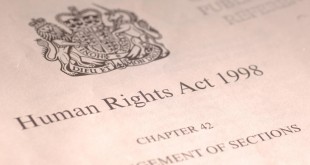The role of national parliaments in the European Union is one that is well established in European Union Law. A declaration annexed to the Maastricht Treaty inspired greater contribution from national parliaments through encouraging the exchange of information between them and the European Parliament and ensuring that proposals for legislation would be made in ‘good time for information and possible …
Read More »Droit comparé
Should the Human Rights Act 1998 be repealed in favour of a ‘British Bill of Rights’?
The role of the Human Rights Act of 1998 on the protection of fundamental rights and freedoms in the United Kingdom is one that is well established in UK law. Once seen as the very touchstone of the incorporation of human rights in the UK, the Human Rights Act was intended to ‘bring rights home’[1], incorporating the European Convention on …
Read More »Le droit anglais en matière de responsabilité civile délictuelle
Le droit anglais de la responsabilité civile, par rapport au droit français, ne repose pas sur une théorie générale des obligations. Paradoxalement, la responsabilité civile n’est pas une notion présente dans les traditions juridiques de Common law. Le English Tort law est marqué par des traces casuistiques tandis que son homologue français fond rigidement le principe de la responsabilité dans …
Read More »Competition law and Mergers in Africa: The COMESA Competition Regulations
While Competition law is at its very beginning in Africa, it has yet to achieve any semblance of common measure with the regulation implemented in the EU. There are however an increasing number of States and supranational institutions that implement competition rules having a strong effect on the African M&A practice. There are many supranational institutions in Africa dealing with …
Read More »The African Charter on Human and Peoples’ Rights: how effective is this legal instrument in shaping a continental human rights culture in Africa?
The past two decades has welcomed a shift in the attitude towards human rights especially within the African state, widely recognised as an ‘egregious human rights violator’[1] where dualism thrives. As a result of increasing international pressure in tandem with widespread despotic regimes across the African continent such as those of Idi Amin and Jean-Bédel Bokassa, the African Charter on …
Read More »L’introduction de la SAS dans l’espace OHADA : Un vent de liberté en Afrique francophone
L’Organisation pour l’Harmonisation en Afrique du Droit des Affaires (OHADA) est une organisation internationale créée en 1993 regroupant 17 États d’Afrique de l’ouest et Centrale. L’OHADA édicte des Actes uniformes contenant des dispositions d’ordre public qui sont par la suite transposées par les États parties dans leur ordre interne. On compte aujourd’hui neuf Actes uniformes dont l’Acte uniforme relatif au droit …
Read More »What is the function of Chinese walls in preventing insider dealing?
Since their creation, capital markets have suffered insider dealings. It has become a more serious threat as the amount of capital transfers largely increased during the 20th century. The Securities Exchange Commission (SEC) on behalf of the US government has been the first agency to challenge this market abuse. In 1968, the SEC settled litigation with Merrill Lynch provided that …
Read More »The unwritten British constitution: in need of a written one?
A recurrent theme in much of the literature with regards to the United Kingdom’s constitutional and administrative law is that it lacks a codified constitution. There has been much talk of constitutional reform in recent years, which has now inevitably become all the more preponderant. In the absence of a written constitution the dichotomy is further accentuated; many acknowledge the …
Read More »Should the English Law stand in the way of medical science saving lives through organ transplantation?
Within the matter of a single year, within the confines of a single nation, organ transplantation saved 1,160 lives. 3,697 people had their sight restored through cornea transplants. And the lives of 3,052 dramatically improved by means of kidney transplantation[1]. Given the facts, one may question the logic behind the English law’s curtailment on organ transplantation in the United Kingdom. …
Read More »Judging in the United Kingdom: a man’s job?
The underrepresentation of women in judicial office is often at the core of judicial diversity arguments. A motivating catalyst for judicial diversity is the structural discrimination and marginalisation that women in law have had to confront. Whilst equality of opportunity is a deeply rooted argument fuelling the appointment of more female judges, it is nonetheless not sacrosanct. While much of …
Read More » Le petit juriste Site de la revue d'actualité juridique
Le petit juriste Site de la revue d'actualité juridique











